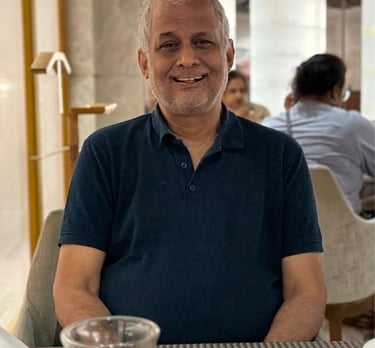BRICS and Blockchain: Paving the Way for Financial Inclusivity and Economic Democracy
This article explores the transformative potential of blockchain technology in promoting financial inclusivity and economic democracy, with a special focus on the BRICS nations. It traces the historical evolution of democracy, examines the pivotal role of money in society, and highlights the BRICS initiative to challenge the US dollar's dominance. Drawing on Gandhi’s critique of centralization, it argues that blockchain offers a decentralized path to true freedom and equity, envisioning a future where economic independence is accessible to all.
TECHNOLOGYINNOVATIONCYBERSECURITYBLOCKCHAINGOVERNANCE
Dr. Bibhu Prasad Rath
7/13/20253 min read


The 20th century has been one of the most memorable periods in history. Imperialism, colonialism and feudalism folded up and monarchy died a natural death, showing that however powerful a tradition may be, it becomes redundant once its role in in social evolution is over.
Concept of Freedom Down the Ages, The Speaking Tree, Feb 18 2003, Times of India
http://timesofindia.indiatimes.com/articleshow/37786236.cms?utm_source=contentofinterest&utm_medium=text&utm_campaign=cppst
By Manoj Das
Historical Evolution of Democracy
Inclusive democracy has long evolved as a system facilitating peaceful transition without violence and bloodshed. And yet, it has been recognized as incomplete without diversity, equity, and inclusion. Financial inclusivity and economic democracy are not only important for a vibrant democracy but also essential to the sovereignty of any country. A debt-ridden nation with a huge outstanding balance of payments cannot exercise sovereignty, much like an impoverished population dependent on promises of freebies by political parties cannot exercise its franchise without bias. A unipolar world, like a centralized democracy, is dependent on a central entity and dances to its tune, where diversity, equity, and inclusion may be compromised.
The Role of Money in Society
Money, a medium of exchange, a measure of value, providing for storage of value, and a standard for deferred payments, is central to our lives. Its value depends not only on what we can buy with it but also on its circulation. Money appreciates the more it changes hands. The US dollar is on a high because most international transactions are in dollars, Gulf countries sell petrol in dollars, and every insurance policy bought anywhere often means another transaction in dollars on the international market. Money begets money, and a centralized system always makes the rich richer. Throughout the planning period in India, interstate and intrastate disparities only increased.
BRICS and the Quest for Financial Independence
The BRICS effort to bring an alternative to the US dollar is not only perceived as a challenge by the US from China, which has an economy about two-thirds the size of the US, but is also seen with suspicion in India, with an economy at 25% the size of China’s, because of the strategic support China provides to Pakistan. Yet, blocks with decentralized, transparent ledgers secured through encryption linking the BRICS countries may assuage India’s concerns and eventually lead to all countries joining hands. Ultimately, central banks must pave the way to secured blockchains.
Gandhi’s Vision of Decentralization
Gandhiji was the sole voice against centralization when most leaders were euphoric about a centrally planned command economy after the Great Depression, particularly because, while Western democracies with individual freedom had a meltdown, the Soviet Union fared much better with its command-and-control economy. Intuitively, Gandhi deciphered that a centralized command economy would crush individual freedom in the guise of protecting it. His vision of an independent village economy and cooperative mechanism can discover new life in blockchains. Microfinance, insurance, and cooperatives can achieve economic independence by operating through blockchains, paving the way for economic freedom.
Blockchain: A Tool for Economic Freedom
True freedom is not about elections and voting but about a feeling of equity with others, dealing with others on equal terms. A hierarchical social order or international order is increasingly irrelevant. Taxpayers’ money is being used to support terrorist activities or fight wars on some pretext or another. Technology so far has contributed to mass production, concentration, and centralization, besides huge greenhouse gas emissions leading to global warming. With the utilization of digitalization and blockchain, discovering the golden chains of financial inclusivity and economic democracy, the next steps in social evolution shall be achieved. Cryptocurrencies backed by blockchain have been highly volatile, with significant price swings that would be considered major events in traditional financial markets. But this is an infant asset class, relatively underdeveloped and immature. As time goes on, with a large number of buyers and sellers, many of the factors that drive volatility will subside.
Conclusion: Towards a More Equitable Future
Whether a people’s currency backed by technology will eventually be transacted across the globe is a moot question. But if there is a collective aspiration, it would manifest sooner rather than later, every individual as a node, participating, overcoming ego and ignorance, and heartily vibrating harmoniously in the global system.


Bibhu Prasad Rath
A.G.M, NTPC
